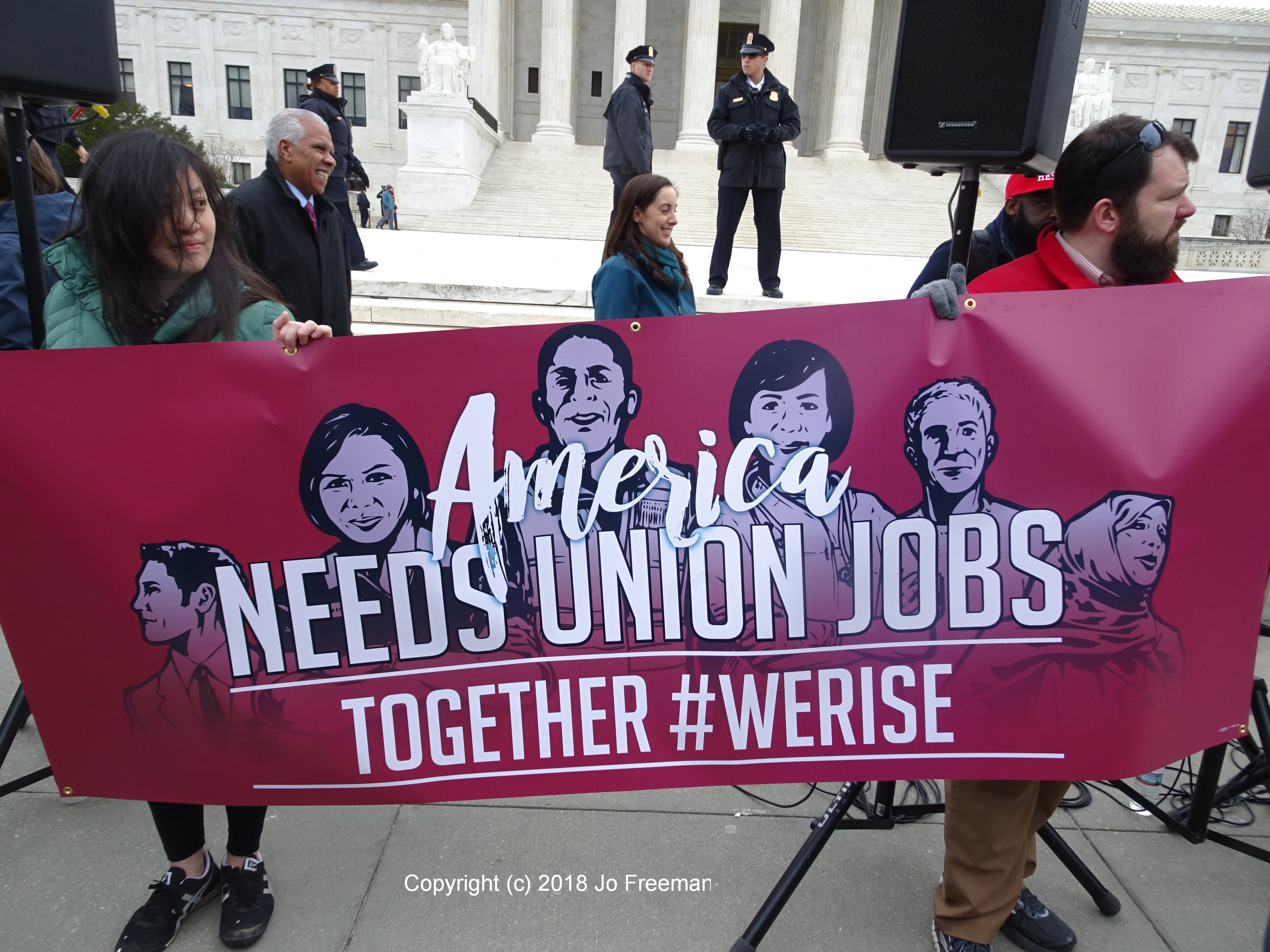Free Speech v. Free Riding, Janus v. AFSCME before the Supreme Court
by Jo Freeman
A thousand people rallied outside the Supreme Court the morning of January 26 while the Justices heard oral argument on Janus v. AFSCME Council 31 inside. The decision in this case will have profound effects on public service unions. Currently, 22 states require employees who do not choose to join a union representing their workforce to still pay agency fees to that union. These are supposed to cover the costs of representation since unions must represent all workers in a bargaining unit and not just their members. Agency fees are less than full union dues, but they aren’t negligible.
Mark Janus, the plaintiff in this case, does not want to be compelled to pay money to a union. He claims that all such contributions are inherently political since unions negotiate with the government and the outcome of such negotiations affect public policy. AFSCME asserts that those who receive the benefits of collective bargaining but pay nothing for it are free riding on the backs of those who do pay.
Thus the issue before the court is whether requiring all public employees in a bargaining unit to pay agency fees violates an employee’s First Amendment right of association and speech and is therefore unconstitutional.
This is the third such case to reach the Supreme Court in the last five years. The last case received a 4-4 split decision in 2016 because Justice Antonin Scalia died before it was made. In the first two cases, the Dept. of Justice supported the unions. In this case, Administration lawyers are arguing that agency fees are unconstitutional.
What’s at stake on both sides is money. Unions know that if all payments were purely voluntary, a lot fewer public employees would pay them. Those opposed to agency payments know that as well. With less money to spend, public service unions might be less effective in securing agreements which cost the state money and possibly lead to lower taxes. Each side argued that there will be other spin-offs which will be deleterious to the greater good, though they didn’t agree on what this is. Over 70 amicus briefs* were filed by different groups which raised various issues about the consequences of deciding this case one way or the other.
Both sides bussed in supporters for the morning rally. About two-thirds of those in front of the Supreme Court were supporting the unions. The rest supported Janus. But without close observation, it was hard to tell which side was which. They were not demographically distinguishable. Both claimed to be supporting workers. On the "anti" side signs said "STAND WITH WORKERS" while speakers repeatedly demanded "choice" and "free-speech." The pro-union signs declared that America needs unions, which are under attack. "UNRIG THE SYSTEM" was a popular sign. So were caps which said, "Stand for Billionaires."
Janus, like the previous cases, is being financed by several right-wing think tanks. The National Right to Work Legal Defense Committee (NRTWLDF) regularly backs cases which undermine unions. The Liberty Justice Center handles cases for the Illinois Policy Institute, which lists "the right to earn a living" and "limited taxation" among its purposes. These groups in turn get their funds from right-wing foundations which also fund legislative efforts to limit workers' rights.** The Koch brothers' "Americans for Prosperity" paid for buses, signs, t-shirts and lunches.
Action was not confined to the Supreme Court. A Working People's Day of Action was held in two dozen cities two days before the argument. Participation in each city ranged from a few hundred to a few thousand. Although these were called by the AFL-CIO with e-mails to all union members, AFSCME provided most of the organizers.
*Amicus briefs are legal documents filed in appellate court cases by non-litigants with a strong interest in the subject matter. The briefs advise the court of relevant, additional information or arguments that the court might wish to consider.
More Articles
- National Archives Virtual Daytime Programs in March; Celebrating Women’s History Month
- Attorney General Merrick B. Garland Delivers Remarks on the First Anniversary of the Attack on the Capitol Washington, DC ~ Wednesday, January 5, 2022
- What is Sex Discrimination? That Was the Question Before the Supreme Court on October 8
- Sex, Race and Religion Flood the Streets of Washington, DC Over MLK Weekend
- California Man Charged with Making Violent Threats Against Boston Globe Employees
- Jo Freeman's Marching for Immigrants – Again; With the Theme of 'We Care'
- Jo Freeman's Convention Diary: Class and Culture at the Republican and Democratic Conventions
- States Make 'Historic and Disturbing Cuts' to Unemployment Benefits
- Encountering Unusual Headwinds: Fed Reserve Vice Chair Yellen Explains the Painfully Slow Recovery for America's Workers
- The Sunlight Foundation Shows Who Drove the Super Pac Contributions in 2011






